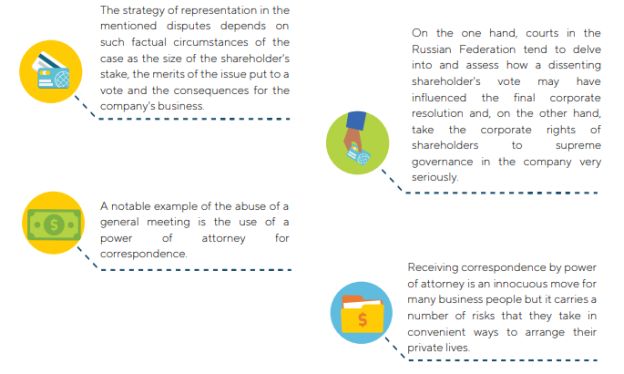Shareholder disputes in Russia, as elsewhere in the world, are among the most sensitive and disruptive in their implications for business. A corporation based on agreement and trust between partners often lives and grows through the common efforts of its shareholders. In situations where disputes arise that cannot be resolved amicably, therefore, the overall business inevitably suffers and often suffers irreparably.
When representing one of the parties to a corporate conflict, we lawyers at GRATA International always educate our clients about the variety of situations and practices that the conflicting parties create in an attempt to prevail over their vis a vi
Since shareholder disputes are usually disputes between people who know each other and the business itself, the disputes escalates from two to three to several dozen separate contests, conducted simultaneously in different courts over the course of several years.
Such legal turbulence inevitably involves the company itself, which begins to be affected by the conflict through problems with the sustainability of economic relations or with obtaining external funding.
However, despite the complexity of this category of cases, we at GRATA International believe that any person in need of qualified protection should receive it at a level that is appropriate for that particular person.
Representing our clients in various shareholder disputes, we use all the tools contained in Russian substantive and procedural law.
The starting point of any consultation is the question of the scope of rights held by the shareholder:
- What is the number of shares a shareholder has?
- What kind of resolutions a shareholder may block?
- May a shareholder withdraw from the company?
- Do the other shareholders have the right of pre-emption of the shares?
- Is the consent of the shareholders required for the alienation?
- Do the corporate documents have a pre-determined procedure for resolving such a situation? How votes are allocated at the general meeting?
Many other issues that make it possible to understand the power and perspective of a shareholder in a corporate conflict.
- First, it is important to pay attention to the legal form of the company, depending on it the approach to resolving corporate conflicts and actions in the corporate conflict will differ.
- It is equally important to study the corporate documents of the company, the shareholders agreement (SHA), if any, the articles of association and other documents to understand what additional rights are available and what can be done in a particular situation
- By understanding your rights and liabilities, the competence of the company's executive bodies and the liabilities of the company and other shareholders, you can build a clear line of conduct and calculate the possible risks.
- Here are some of the most popular strategies in this article. See if you can find your case among them.
DISPUTES OVER SHAREHOLDERS RESOLUTIONS MADE BY SHAREHOLDERS.
Disputes arising from a shareholder's disagreement with a company resolution can be included in this capacious category. The range of violations we observe in companies is quite broad. Breach of the procedure for convening and holding the meeting, breach of a shareholder's right to review the materials drafted for the meeting and breach of the rights of a minority shareholder who voted against a resolution to approve a major transaction.

- A former shareholder of a company who had found out that he had
ceased to be a shareholder of the company some time ago approached
us. The investigation of the circumstances of the case revealed
that without the client's knowledge several meetings had been
held consecutively at short notice resulting in reorganisation of
the company (with complete loss of corporate control of the client
who did not take part in the meeting and conversion of his shares
in ZAO into nil shares in LLC), establishment of a subsidiary
company, transfer of all liquid assets to the subsidiary company
and launch of liquidation procedure of the parent company.
- Not everyone is aware that when legal action is properly taken, applicable law permits such unfavorable developments for the company owner. In particular, repeat meetings in public limited companies provide for a reduced quorum for the adoption of resolutions - sufficient to leave the owner without a significant portion of its assets. In this particular case, notification of meetings to the shareholder was done through a person acting under a power of attorney - through a courier who picked up the correspondence without informing the trustee. It took years of court hearings and a fierce adversarial process to regain corporate control for our client, return real estate to the company and contest the pledge of the property. The final stage was the expulsion of the wrongdoer from the company.
DISPUTES ARISING IN RELATION TO SHAREHOLDER ACCESS TO INFORMATION ON COMPANY OPERATIONS.
Disputes regarding shareholders' access to information on the company's operations are quite common. Russian corporate law obliges a company to provide shareholders with access to information on the company's business operations at their request. Not infrequently, it is only by gaining access to such information that shareholders can learn about transactions that are detrimental to the company. Accordingly, management and majority shareholders are motivated to withhold such information. As a rule, courts satisfy shareholders' requests for documents and information. However, depending on the legal form of the company, the approach may differ. Whereas in an LLC a shareholder is entitled to obtain any documents, in joint-stock companies the scope of documents requested depends on the shareholding in the company's authorized capital.
DISPUTES OVER TRANSACTIONS MADE BY THE COMPANY.
Frequently a director of a company acts in the interests of one of the shareholders or for the shareholder himself to be a director. Over time, this can lead to the company making a transaction that is not in the interests of the business. Issuing or obtaining a loan, disposing of a large asset, or purchasing raw materials from a company that is associated with the CEO. The applicable corporate law critically perceives such business activity. A shareholder who learns of such a transaction has the right to assert a claim to return the parties to their original position and to recover the damages caused to the company. In extreme situations, where the company has suffered substantial damage, the question of expulsion of the shareholder from the company may be raised. Depending on the circumstances of the case, the court may side with the aggrieved party and award the excluded shareholder compensation for the loss of shares.
Click here to continue reading . . .
The content of this article is intended to provide a general guide to the subject matter. Specialist advice should be sought about your specific circumstances.


